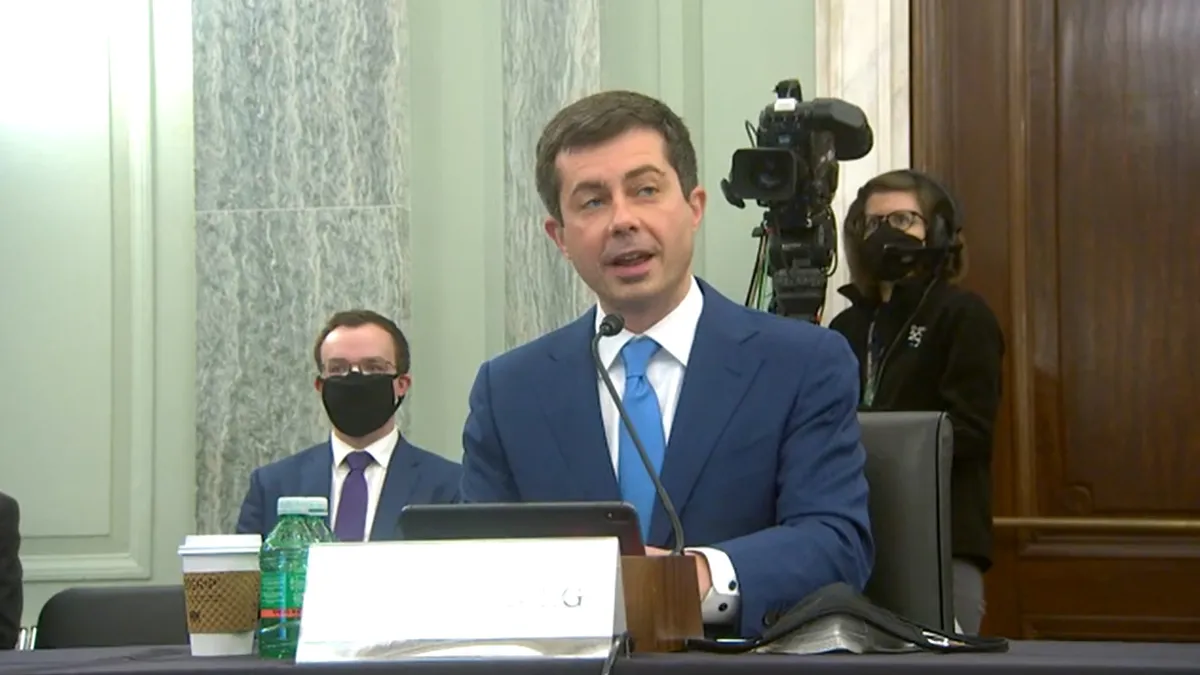Dive Brief:
- Industry and elected leaders praised Pete Buttigieg's confirmation as Transportation Secretary after his nomination passed the U.S. Senate 86-13 on Tuesday.
- Buttigieg's confirmation could be a boon for investment in the nation’s infrastructure, which has been called for on a bipartisan basis for many years, according to experts.
- Several officials emphasized how Buttigieg's experience as mayor of South Bend, IN, will stand him in good stead at the U.S. Department of Transportation (USDOT), especially as he knows the challenges local leaders face. "City leaders know these critical issues best," Los Angeles City Council President Pro Tempore Joe Buscaino said. "They know what's happening on the ground, and the work of Secretary Buttigieg reflects better the priorities of city leaders across this country."
I'm honored and humbled by today's vote in the Senate—and ready to get to work @USDOT.
— Pete Buttigieg (@PeteButtigieg) February 2, 2021
Dive Insight:
During his nomination hearing before the U.S. Senate Committee on Commerce, Science and Transportation late last month, Buttigieg said the "time is now" for a massive infrastructure investment in a bid to jump-start the economic recovery from the coronavirus pandemic. And representatives of all political stripes pledged to work together on an infrastructure package, which was promised under President Trump but failed to materialize.
President Biden has made similar pledges about infrastructure. In a statement, Rep. Sam Graves, R-MO, Ranking Member on the House Committee on Transportation and Infrastructure, said common ground between Buttigieg and Republicans in Congress includes the need to invest in rural infrastructure, needing to find a long-term funding solution for the Highway Trust Fund and moving projects ahead more efficiently. "I sincerely believe we can find common ground," Graves said.
Opponents of Buttigieg's nomination said local-level experience will not be enough to manage USDOT. "Fixing municipal potholes and managing bus routes in no way equates to what he will oversee at DOT," U.S. Sen. Roger Marshall, R-KS, said in a statement after his vote against the confirmation.
Buscaino, who is also the immediate past president of the National League of Cities, rejected that characterization. Local governments are much closer to the people that they serve, and their decisions have a much more immediate impact, he said.
"We are the heartbeat of America," Buscaino said. "[It's] happening not in Washington, DC. It's happening in cities across the country. We also need to realize that our nation is strongest when all levels of government work together to do what's best for our residents, constituents and businesses."
Buttigieg comes into USDOT with the agency facing the economic fallout from the coronavirus pandemic and many transportation sectors calling for additional aid. In a letter to Congress on Monday, transit leaders called for an additional $39.3 billion in emergency funding. In a statement congratulating Buttigieg, the American Public Transportation Association reiterated that call "to help public transit agencies continue to provide a critical lifeline to essential workers and help our communities begin to rebuild our economy."
And transportation officials called on Buttigieg to look to the future of the sector, and embrace innovations like autonomous vehicles, electric vehicles and new thinking in areas like street design.
Intelligent Transportation Society of America President and CEO Shailen Bhatt said in a statement the organization would work with USDOT to "help ensure the U.S. transportation system is safer, greener, smarter and more equitable." And with climate change and equity top-of-mind for governments at all levels, there are calls for him to look to the future.
"As a former Mayor, Secretary Buttigieg knows how streets and transportation networks can build the foundation for a just, sustainable future," National Association of City Transportation Officials executive director Corinne Kisner and chair Janette Sadik-Khan, said in a joint statement. "The choices made now will set outcomes for future decades, just as unsustainable choices in the past divided communities, created unsafe streets, and locked the U.S. into emitting unsustainable levels of greenhouse gases."
















